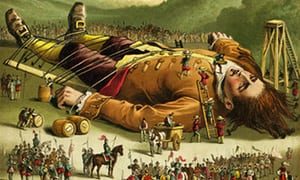“Satire is, by definition, offensive. It is meant to make us feel uncomfortable. It is meant to make us scratch our heads, think, do a double-take, and then think again.” -Maajid Nawaz

Jonathan Swift (1667-1745) was a controversial writer in his time. Satirizing politics and society, his pamphlets and essays sent shock waves across England. One of Swift’s greatest works is the episodic narrative Gulliver’s Travels. Published in 1726 and detailed with insignificant information, the book mimicked the current fashion of travel journals. Gulliver’s Travels follows the journeys of Lemuel Gulliver, an English ship’s surgeon. Calamities cause Gulliver to happen upon many queer lands. In Lilliput, all the people stand a mere six inches tall, while in Brobdingnag, Gulliver is but a mere plaything to forty-foot giants. Laputa is an island high in the air, whose inhabitants study philosophy and astrology, and literally have their heads in the clouds. And the Houyhnhnms are horses, who have the ideal community of peace and unity. Each land, each set of people, represent and satirize something in English society. The whole book is filled with double meanings; at every turn Swift strips another human ideal down to its bare inconsequence.
It is unquestionable that Swift makes use of satire at its highest level. But is he justified in doing so? Many defend Swift’s literary practice. However, critics argue that the satire in Gulliver’s Travels is too absurd, or unduly offensive. Swift’s usage of satire in Gulliver’s Travels is appropriate for three main reasons: the concept is genius, the method is effective, and the results are timeless.
Firstly, the art of satire in Swift’s writing is legitimate because it produces a work of brilliance. For example, Gulliver’s Travels is artfully multi-faceted. On one level, it is a children’s story with some mild fantasy. At another level, it is a parody of the petty travel journals in Swift’s time. On yet a third level, it is a challenge to prim European society. Combining all the individual levels into a well-written book is simply ingenious. Second, Swift’s book is universally applicable. It is a children’s story, a window into English history, a twist on science fiction, and a thought-provoking perspective on humanity. No matter who the individual is who reads Gulliver’s travels, he can find some aspect of the story with which he can relate. Third, Gulliver’s Travels is skillfully complex. Swift uses numerous methods of satire: the format of the book shows how ludicrous travel journals were; each individual personifies a characteristic of humanity; Gulliver’s simplicity and optimism increases the effect of other methods of satire. The complexity, universal relevance, and multi-faceted style unite to create a show-stopping composition.
Why is Swift’s use of satire justified? It is an effective way to make a point. For example, satire provokes thought. Is humanity really as small and proud as the Lilliputians, or as base and disgusting as the Brobdingnagians? How does today’s culture compare to the lands in Gulliver’s Travels? To continue, satire conceals arguments. It presents a way to reach individuals who otherwise would not allow their ideals to be challenged. Via this subtle yet direct method of communication, Swift’s groundbreaking ideas influenced a wide range of people. Lastly, satire allows for individual interpretation. Does one think the utopian ideal of the Houyhnhnm society overcomes the lack of individuality therein? Is there hope for humanity? Is it better to be a loner, like Gulliver at the end of the book, or to be swept away with the stupid flow of society? Can there be a balance in between the two extremes? Through satire, arguments in Gulliver’s travels are thought-provoking, cunningly concealed, and individually interpretable.
Thirdly, the satire in Gulliver’s Travels is legitimate because it gives a timeless perspective. The first area Swift’s work has stood the test of time is in politics. Consider the Lilliputian’s method of electing ministers: they were judged by how well they could walk a tightrope. At the time Swift was calling into account King George’s ludicrous election of political advisers based on family and money. The tightrope concept also applies to today’s crooked political world and the deception that runs rampant in politics today. The second area Swift’s satire has endured time is in the realm of fashion. The fashion of meticulous travel journals in the 1700s is easily comparable to the detailed rants on social media today. Swift also criticizes divisions based on fashion, such as the political parties being marked by the size of the heels on their shoes, or a war based on which side to crack an egg on. The third timeless effect of the satire in Swift’s writings is in relation to society. Humanity is still as puffed up as the Lilliputians, as loathsome as the Brobdingnagians, and as lost in the clouds as the Laputians. Swift’s satire of society applies today as much as or more than it did in his own time. The work is timeless in regard to politics, fashion, and society.
Critics assert that Swift’s use of satire is unjustifiable. They hold that it is offensive, crude, and controversial. However, any good work will be controversial. And the crudeness of Gulliver’s Travels is there for a reason: to tear down the uppity ideals of society.
Critics also say that the satire is ridiculous. They claim that it is fantastical and extreme. Yet the very definition of satire is in line with this. Satire is meant to be ridiculous and extreme- to make a point. The very ridiculousness of it proves a point better than many other forms of writing.
In conclusion, Swift is justified in his use of satire for three reasons: it is genius, effective, and timeless. This is an issue relevant to all who care to read Swift’s writing, as his satire is a key for perspective. It is like a glass sword to the mind: piercing, though invisible. For this reason, Jonathan Swift’s works are loved and appreciated, though hundreds of years have passed.
